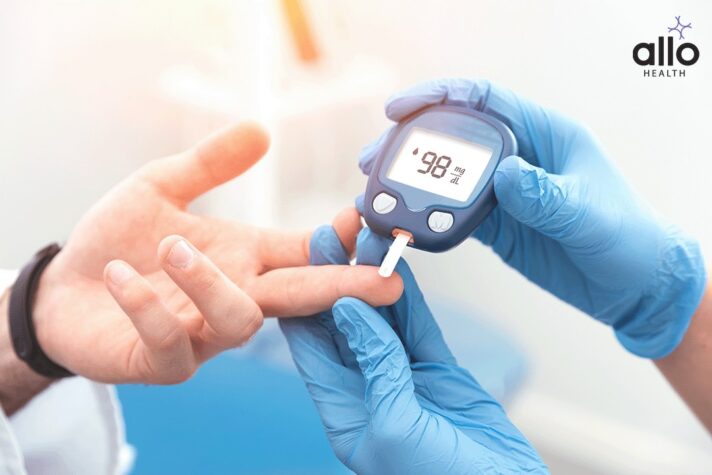Exploring the Link Between Tadalafil and Diabetes

Allo Health is dedicated to personalized well-being, offering support and trusted information tailored to individual health goals. The platform emphasizes human-generated content, led by a distinguished medical team of experts, including physicians and sexual health specialists. Their commitment to credibility involves rigorous fact-checking, authoritative research, and continuous updates to ensure accurate, up-to-date information. Allo Health's unique approach goes beyond conventional platforms, providing expert-led insights and a continuous commitment to excellence, with user feedback playing a crucial role in shaping the platform's authoritative voice.

Dr. Aditi completed her undergraduate medical education at AJIMS, Mangalore, after which she worked in multi-speciality hospitals with COVID patients and in the Pain and Palliative medicine department. Driven by her experiences, she developed a keen interest in psychiatry. Dr. Aditi believes that mental health is just as, if not more important, than physical health.
Why This Was Upated?
Our experts continually monitor the health and wellness space, and we update our articles when new information became available.
Updated on 20 February, 2024
- Article was updated as part of our commitment to diversity, equity, and inclusion.

"The following blog article provides information about a drug or brand name drug and its potential effects or benefits. However, it is crucial to understand that this information is intended for general educational purposes only and should not be considered a substitute for professional medical consultation. It is highly recommended to consult with a qualified healthcare professional before making any decisions regarding medication, treatment, or healthcare management.
Book consultation
Individuals have unique medical conditions, and the information provided in this article may not be applicable to everyone. Only a qualified healthcare provider can evaluate your specific medical situation, taking into account your medical history, conducting appropriate tests, and providing personalized advice and recommendations. They are equipped to make informed decisions tailored to your individual needs.
It is crucial to emphasize that self-diagnosis, self-medication, or disregarding medical advice can have serious health consequences. This article may reference specific brand names or drugs for illustrative purposes. Mention of these names does not imply endorsement, recommendation, or guarantee of their efficacy or safety. The choice of medication should be based on discussions and individualized guidance from a healthcare professional who has a comprehensive understanding of your medical condition.
"Diabetes is a chronic condition that affects millions of people around the world. It occurs when the body cannot produce enough insulin, leading to high blood sugar levels. This condition can have serious consequences, including heart disease, kidney damage, nerve damage, blindness, and more. Erectile dysfunction (ED) is another common health concern among men with diabetes. In recent years, there has been a growing interest in the link between Tadalafil and diabetes. Tadalafil is a popular medication used to treat erectile dysfunction, but is there any evidence suggesting that it could help with diabetes? Let’s explore this topic in detail.
What Is Tadalafil?
Tadalafil is a medication primarily used to treat erectile dysfunction (ED) in men. It belongs to a class of drugs known as phosphodiesterase type 5 (PDE5) inhibitors. This medication helps relax the muscles in the blood vessels, allowing increased blood flow to certain areas of the body. Tadalafil was originally developed by the pharmaceutical company Eli Lilly and Company and is sold under the brand name Cialis.
Here are key details about Tadalafil:
- Mechanism of Action:
- Tadalafil works by inhibiting the action of phosphodiesterase type 5 (PDE5), an enzyme that breaks down cyclic guanosine monophosphate (cGMP).
- Inhibition of PDE5 increases the levels of cGMP, leading to relaxation of smooth muscles and vasodilation (widening of blood vessels).
- Indications:
- Tadalafil is primarily prescribed for the treatment of erectile dysfunction (ED), a condition where a man has difficulty achieving or maintaining an erection sufficient for sexual activity.
- It is also used for the treatment of symptoms of benign prostatic hyperplasia (BPH) and pulmonary arterial hypertension.
- Dosage Forms: Tadalafil is available in various dosage forms, including tablets and oral jelly. The tablets come in different strengths (e.g., 2.5 mg, 5 mg, 10 mg, and 20 mg), and the recommended dose depends on the individual’s health condition and the intended use.
- Duration of Action: Tadalafil has a longer duration of action compared to some other PDE5 inhibitors, such as sildenafil. The effects of Tadalafil can last up to 36 hours, earning it the nickname “the weekend pill.”
- Usage Precautions:
- Tadalafil should not be taken with nitrates or nitric oxide donors, as the combination may cause a significant drop in blood pressure.
- It is important to inform healthcare providers about existing medical conditions, medications, and any history of cardiovascular concerns before starting Tadalafil.
- Side Effects: Common side effects of Tadalafil may include headache, muscle pain, back pain, indigestion, and flushing. Serious side effects are rare but may include sudden vision or hearing loss.
- Interactions: Tadalafil can interact with certain medications, including alpha-blockers, antihypertensives, and drugs containing nitrates.
- Generic Versions: Generic versions of Tadalafil are available under different names. These generics contain the same active ingredient and are used to treat the same conditions.
It’s crucial to note that Tadalafil should only be taken under the supervision of a healthcare professional, and individuals should follow their prescribed dosage and instructions. Seeking medical advice before starting any medication is essential to ensure safety and efficacy.
Exploring The Link Between Tadalafil and Diabetes

The use of Tadalafil (Cialis) in individuals with diabetes is a topic of interest and clinical research, as diabetes can be associated with erectile dysfunction (ED) due to vascular and nerve damage. Here are some details exploring the link between Tadalafil and diabetes:
- Erectile Dysfunction in Diabetes:
- Diabetes, particularly type 2 diabetes, can have adverse effects on the vascular and nervous systems. These effects may contribute to the development of erectile dysfunction in men with diabetes.
- Vascular damage can lead to reduced blood flow to the penis, making it difficult to achieve and maintain an erection.
- Nerve damage (neuropathy) can affect the transmission of signals between the brain and the penis, disrupting the normal erectile process.
- Mechanism of Action of Tadalafil:
- Tadalafil, a phosphodiesterase type 5 (PDE5) inhibitor, works by increasing the levels of cyclic guanosine monophosphate (cGMP). This results in the relaxation of smooth muscles and increased blood flow to the penis, facilitating an erection.
- Effectiveness in Diabetic Patients:
- Clinical studies have demonstrated the effectiveness of Tadalafil in treating erectile dysfunction in men with diabetes. Tadalafil has shown to improve erectile function and sexual satisfaction in diabetic individuals.
- The ability of Tadalafil to enhance blood flow and promote vasodilation is particularly beneficial in the context of diabetes-related vascular concerns.
- Duration of Action:
- The prolonged duration of action of Tadalafil (up to 36 hours) may offer flexibility in timing sexual activity, which can be advantageous for individuals with diabetes who may not engage in spontaneous sexual encounters.
- Considerations and Precautions:
- Individuals with diabetes should inform their healthcare provider about their condition, as well as any other medications they are taking, before starting Tadalafil.
- It is crucial for healthcare professionals to assess the overall health of individuals with diabetes and consider potential interactions with other medications.
- Tadalafil should not be used in conjunction with nitrates or nitric oxide donors, as this combination can lead to a significant drop in blood pressure.
- Cardiovascular Considerations:
- Diabetes is often associated with cardiovascular risk factors. Tadalafil has been shown to have a positive impact on endothelial function and arterial stiffness, which may be beneficial for individuals with diabetes and associated cardiovascular concerns.
- Individualized Treatment Approach:
- The decision to use Tadalafil in individuals with diabetes should be individualized, taking into account the overall health status, cardiovascular risk factors, and potential interactions with other medications.
Tadalafil can be an effective treatment option for erectile dysfunction in individuals with diabetes. But, it is essential for healthcare providers to carefully assess each patient’s unique circumstances and consider potential interactions and risks before prescribing Tadalafil. Individuals with diabetes should consult their healthcare professionals for personalized advice and guidance on the use of Tadalafil.
Most Asked Questions
-
How does Tadalafil help individuals with diabetes experiencing erectile dysfunction (ED)?
Tadalafil, a phosphodiesterase type 5 (PDE5) inhibitor, enhances blood flow by increasing levels of cyclic guanosine monophosphate (cGMP). This mechanism promotes smooth muscle relaxation in the penis, addressing vascular and nerve-related concerns common in diabetes and facilitating improved erectile function.
-
Can individuals with diabetes safely use Tadalafil?
Yes, Tadalafil is generally safe for individuals with diabetes. But, it's crucial to inform healthcare providers about diabetes and any medications being taken. Careful consideration of the overall health status and potential interactions is essential before prescribing Tadalafil.
-
How long does the effect of Tadalafil last, and why is this significant for individuals with diabetes?
Tadalafil's effects can last up to 36 hours, offering flexibility in timing sexual activity. This prolonged duration can be advantageous for individuals with diabetes who may not engage in spontaneous encounters, allowing for improved sexual satisfaction and spontaneity.
-
Are there specific precautions for diabetic individuals using Tadalafil?
Yes, diabetic individuals should avoid combining Tadalafil with nitrates or nitric oxide donors, as this combination can lead to a significant drop in blood pressure. Open communication with healthcare providers is essential to ensure a safe and effective treatment plan.
-
How does Tadalafil impact cardiovascular considerations in diabetes?
Tadalafil has shown positive effects on endothelial function and arterial stiffness. This is particularly relevant for individuals with diabetes, who often face cardiovascular risks. The medication's impact on vascular health can be an additional benefit for those managing both diabetes and associated cardiovascular concerns.






































